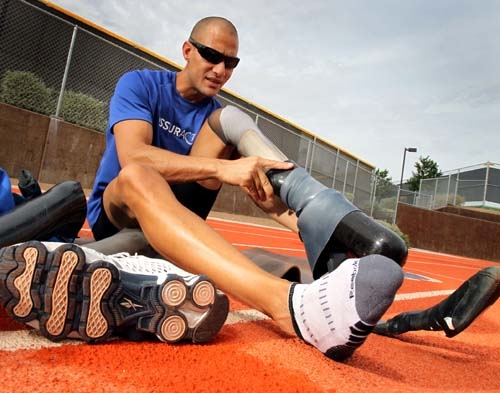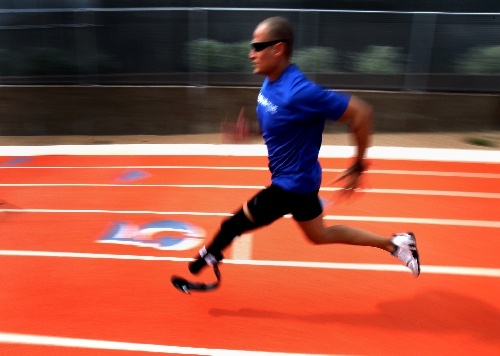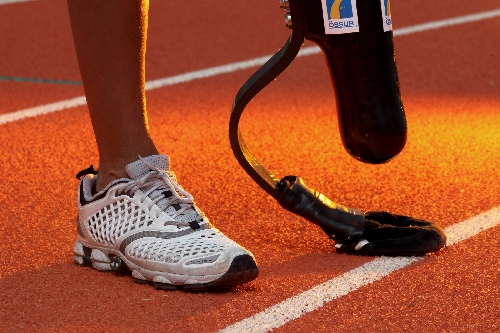Las Vegan overcame abandonment, disability to achieve Paralympic greatness




Before the Blade Runner, there was the forerunner.
Before Oscar Pistorius – the South African sprinter who this summer became the first double amputee ever to compete in the Olympics – there was American Marlon Shirley, who had previously owned the title of "World’s Fastest Amputee."
Shirley, who lost his left foot at age 5 in a lawn mower accident at the since-shuttered Southern Nevada Children’s Home in Boulder City, was the first amputee to break 11 seconds in the 100-meter dash and a pioneer of the Paralympics – the Olympics for athletes with disabilities that starts Wednesday in London.
He captured Paralympic gold medals in the 100 in 2000 and 2004, when he sprinted past Pistorius in Athens.
The 34-year-old Shirley’s bid to cap his career with a third straight gold in track’s showcase event came to a crushing end in Beijing in 2008, when he tore his Achilles’ tendon midway through the final won by Pistorius – who swept the sprints (100, 200, 400).
Refusing to be carted off, Shirley somehow willed himself across the finish line – showing the courage and grit that helped carry him through the bleakest of childhoods.
ABANDONED ON THE STREETS
His deceased mother, Lindy Lebolo, was a prostitute and heroin addict. His father was her pimp.
Shortly after Shirley was born, his mother fled with him from her hometown of Richmond, Va., to Las Vegas, where they sought refuge at the Blue Angel Motel on East Fremont Street.
Abandoned on the city streets at age 3 as his mother battled her demons, Shirley was picked up one day by social service workers, wearing only a bathing suit as he wandered alone outside the motel.
He learned later that his grandfather, Joe Lebolo, had notified police of his whereabouts. But Shirley – whose mother was white and father was black – also discovered his grandfather had refused to take him in because of the color of his skin.
"He didn’t want to associate with me because I was half black," Shirley said. "It was a very well-to-do family. It is really, really sick."
While horsing around with a caretaker on a riding mower at the Children’s Home, Shirley’s foot slipped into the chute and was mangled by the blade.
He bounced back quickly from his severed limb, but his emotional and mental wounds cut deeper.
"The last time I saw my mom was in the hospital," he said. "I remember her walking out the door."
Alone and confused, Shirley once told a caseworker, "My mom must’ve died. Because why hasn’t she come to see me?"
Shuffled from one foster home to the next, Shirley was 7 when he was physically and emotionally abused by a local couple.
"They beat the (crap) out of me," he said.
Caught sneaking into bags of Halloween candy he’d hoarded, Shirley was ordered to eat the candy until he vomited. He then was forced to eat the vomit.
After 18 months, his foster parents sent him back to the children’s home.
FINALLY FINDING HIS PLACE
When he was 9, he was finally adopted by a loving family from Tremonton, Utah: Marlene and Kerry Shirley and their three other children.
A natural athlete who refused to be slowed by his disability, Shirley played football and competed in track and field for Bear River High. He also played church league softball and basketball.
"When I was in high school I’d never even seen another amputee," he said. "I just did everything like everybody else would. I think that took me to the next level, because I had to keep up or surpass them."
During his junior year, doctors had to further amputate Shirley’s left leg, this time above the ankle. The surgery left the self-conscious teenager on crutches, with a cast covering his stump.
"I didn’t go to school for months until I could walk again because I didn’t want people to see me like that," he said.
But Shirley soon bounced back and, during his senior year, his future came into focus at a national indoor track meet in Idaho.
After clearing 6 feet 4 inches on the high jump with an unconventional headfirst dive, Shirley was approached by coach Bryan Hoddle, who urged him to train for the Paralympics.
"The ability to jump 6-4 is one thing, but headfirst is unbelievable," said Hoddle, who coached the 2004 U.S. Paralympic team. "It was really obvious he had incredible athletic ability.
"He had a very supportive family, too. That’s really, really important at the elite level."
BECOMING A CELEBRATED PARALYMPIAN
Shirley exploded onto the Paralympic scene, setting world records in the high jump and long jump before garnering his first gold in 2000 in Sydney.
But he could not outrun his past. Shortly before leaving for Australia, Shirley spoke with his grandmother, Minnie Lebolo, for the first time and learned the hard truth about his biological family, including the fact his birth mother had died in 1992 at age 35.
As sobering as that conversation was, Shirley said he doesn’t dwell on the past.
"It’s just unneeded stress," he said. "I’m not one to go back and rehash old situations because I just don’t give a (damn).
"I know where I’m going, I know what I want and I’m pretty focused on that."
A few months before Beijing, Shirley contracted a serious staph infection in his left knee that caused him to lose 43 pounds in four weeks and fear for his life.
"While I was in the hospital, we had a family friend die from a staph infection," he said. "It was just so extreme, to go from being in the best shape of my life to fighting for my life within a few weeks’ time."
Shirley had nine surgeries and was bedridden for two months before the infection finally cleared.
He barely had two months to regain his form for the Paralympics, but decided to give it a shot.
"I thought, ‘If I’m going to fail, I’m going to fail trying,’ " he said.
After dragging himself to the finish in Beijing, Shirley spent the past four years training for his shot at redemption – and a rematch with Pistorius – at the London Games. But he won’t get that chance.
He failed to qualify for the U.S. team at the track and field trials in Indianapolis – missing by .01 seconds in a heartbreaking 100 in which Great Britain’s Jonathan Peacock broke Shirley’s world record (10.91 seconds) with a time of 10.85 seconds.
"I was actually shocked I didn’t qualify. I still don’t know why I didn’t run better," said Shirley, who plans to retire after next year’s world championships. "It was a really tough day. Not only did I lose, but my record was broken."
MOVING ON WITH HIS LIFE
His record may be gone, but Shirley’s legacy in the sport is secure. Hoddle, who works with amputee soldiers across the country, said Shirley and four-time Paralympic gold-medal winner Tony Volpentest – who was born without hands or feet – made a lasting impact on people with disabilities.
"It’s really amazing the number of people I come across who remember Tony and Marlon and were inspired by them," he said. "Both Tony and Marlon left an incredible legacy. Not only were they good athletes and good people, they were pioneers for Paralympics track and field."
Shirley, who shares his story as a motivational speaker, also has inspired plenty of able-bodied athletes, including several at Bishop Gorman, where he was a volunteer assistant track and field coach the last two years.
"He has a great rapport with the kids," Gaels coach Scott Cooley said. "They really look up to him."
So does Cooley.
"He’s somebody I look up to every day," he said. "He has a great attitude and an amazing story of how he dealt with adversity in his life. He definitely came out a winner."
Dylan Weldon, a junior sprinter at Gorman, agrees.
"A lot of athletes look up to him because of his story and what he was able to accomplish," he said. "Even though he went through what he did, he kept pushing and didn’t give up."
Shirley moved back to Las Vegas two years ago, in part, to be closer to his girlfriend. A man of many passions, he’s a nine-handicap golfer, licensed pilot and accomplished poker player.
But Shirley still finds time to give back. In addition to volunteering at Gorman, he recently launched a free interactive personal fitness website – ossur.com/active – for people with disabilities.
"I went through the (worst) things you can go through and I was still able to keep my faith and keep my drive to be successful, whether it was on the track or off the track," Shirley said. "I just think it goes to show how much perseverance we have and how diligent we are as human beings."
Contact reporter Todd Dewey at tdewey@reviewjournal.com or 702-383-0354.












